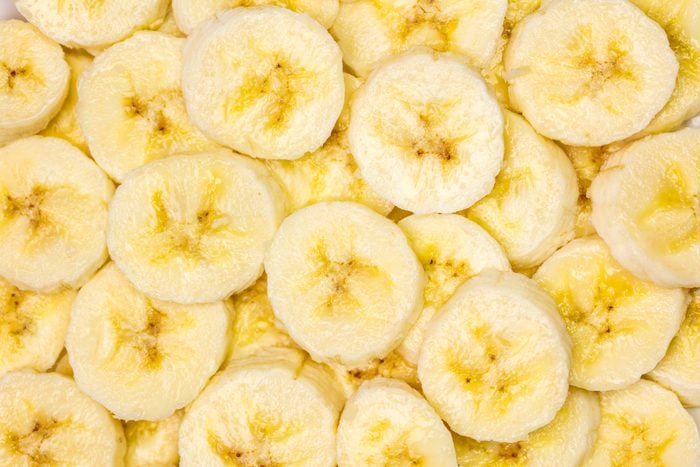I Ate Bananas Every Day for a Week—Here’s What Happened
Updated: Apr. 05, 2024

Lots of Americans eat bananas every day! A doctor gave this fruity favorite a week-long test-run to observe the health effects, with insights (and a favorite banana dish) from a Cleveland Clinic nutrition expert.
There’s just something universally appealing (I had to!) about a banana. Bananas are the everyday fruit that slice so perfectly into cereal, blend beautifully into smoothies, accompany you on rushed mornings and occasionally sneak into your dessert. Thanks in part to the pure convenience factor of grabbing one when you need something quick and healthy, Americans are bananas about this tropical treasure—so much that the Mayo Clinic suggests the average American eats 27 pounds’ worth of bananas per year.
Bananas aren’t just a breeze to grab on the go—they’re filled with some unsung health advantages. As a trained family doctor who gained certification in nutrition coaching and diabetes prevention, I was curious find out what I might observe if I were to get intentional about eating bananas. Over the course of a week I gave an extra boost to my regular banana intake, seeking in-depth wisdom from Maxine Smith, RDN, LD, a registered dietitian nutritionist at the Cleveland Clinic Center for Human Nutrition. Here’s what I learned over the course of my very sweet week.
The health benefits of bananas
Bananas are often regarded as one of nature’s most convenient snacks, but their acclaim doesn’t stop at accessibility. As an expert in diet and nutrition, Smith explained the nutritional benefits of bananas: “Bananas are a starchy fruit that are rich in vitamins and minerals. They are a good source of fiber, vitamin B6, contribute a fair amount of vitamin C, potassium and manganese to the diet. They provide a healthy source of carbohydrates to help keep energy levels up during the day.” If you’ve ever heard buzz that bananas are too sugary to be good for you, fret not: Here’s how much sugar is really in a banana, and why that’s a totally different ballgame from eating junk food or soda.
Particularly about potassium—a standout nutrient in bananas—Smith says, “Potassium is an important nutrient for helping muscles to contract properly, including the heart muscle.” She explains that potassium “is an important nutrient to help control blood pressure” and that it also “supports healthy kidney function.” However, she adds, some banana-lovers should beware: “If your kidneys are not working properly, please ask your doctor if you need to limit your intake of potassium-rich foods such as bananas.” Too many bananas could lead to potassium build-up in the body, which can be dangerous for your health.
Here’s how often it’s healthy to eat a banana
Given their rich nutrient composition and how many Americans love them, it’s only natural to wonder how often it’s OK to eat bananas.
Smith says striking a balance is key, and you’ll want to make sure to eat a variety of other plant foods. “There is no specific recommendation for the number of bananas a week,” she says. “Variety is golden. Choosing bananas as part of your daily or weekly fruit mix can be a healthy choice.”
This dietitian’s bigger rule of thumb? “Aim for [approximately] three servings of fruit a day.”
A Dietitian Just Shared the Actual Reason Bananas Are an Ideal Workout Food
Eating bananas every day for a week
Throughout the week I ate bananas, I experimented with new recipes while embracing classic favorites. Starting with a simple smoothie where the banana’s natural sweetness stood out, the next day I made a refreshing açaí bowl that paired the creamy texture of bananas with the tartness of blueberries and crunchy granola.
Midweek, I slathered almond butter on toast and used banana slices as a naturally sweet topping (with some cinnamon). A plain banana and peanut butter combo provided a classic and energy-packed snack, while three-ingredient banana pancakes became a breakfast favorite.
Eating This Berry Can Improve Your Heart & Brain Health in 8 Weeks, New Study Says
When I ate bananas every day, I was more regular
Regularly incorporating bananas into my diet gave way for a smoother and more consistent digestive experience. I found myself less bloated and experienced regular bowel movements.
There’s an old wives tale that suggests bananas can cause constipation, but scientifically that’s inaccurate. Smith helped explain the opposite effect: “Bananas contain both soluble and insoluble fibers that help keep bowel movements regular,” she explained. “These fibers can slow down the passage of food through the stomach and help produce softer, bulkier stools.”
That fiber from bananas is valuable. “Fiber is like fertilizer for the healthy bacteria in our gut,” she says. “We now know that a variety of healthy gut bacteria is important to optimize our intestinal health and for good digestion and absorption of our food.” For more on this, read The Banana Health Benefit You for Sure Weren’t Aware Of.
5 Easy Steps to Reset Your Gut Health, Says a Doctor
When I ate bananas every day, I had more energy
One of the most standout effects during my week was the noticeable lift in my energy levels. Smith provided a perspective that made sense: “Fruit, in general, can undeservingly get a bad rap because they are a main source of carbohydrate and sugar in the diet,” she says. “But keep in mind that carbs and sugar from whole foods, such as fruit, act much differently in the body than processed carbohydrate and sugar sources such as table sugar, sweet drinks, candy, cookies and white bread.”
It was tangible how the natural sugars in bananas provided energy that felt different from the fleeting rush you might get from processed sugars. Bananas provide a steady release of energy, ensuring the body isn’t subjected to sharp spikes and subsequent crashes.
When I ate bananas every day, I was in a better mood
Eating bananas daily surprisingly boosted my mood. Bananas are a good source of tryptophan and vitamin B6 that both aid in producing serotonin, a neurotransmitter linked to mood regulation and cognitive function. As the body doesn’t produce tryptophan or vitamin B6 naturally, consuming foods rich in these components becomes important—and it might just improve how you feel!
Need a Mood Boost? Go Bananas, Says a Nutritional Biochemist
Caveats to consider
While I had a positive experience, I sought Smith’s guidance on the potential drawbacks of consuming too many bananas. She explains: “Bananas are calorie and carbohydrate-rich compared to other fruits. For example, a four-inch piece of banana has about the same number of calories and carbohydrates as one cup of berries. Eating too many bananas could kick your calorie and carbohydrate intake up, which could be a problem if you are trying to manage your weight or control your blood sugars.”
This Cleveland Clinic nutrition expert also added a word of caution for those new to a fiber-rich diet: Ease into it to avoid potential digestive concerns.
Fun ways to incorporate bananas into your diet
Smith ended with some culinary inspiration: “My granddaughter and I love whipping up ‘ice cream’ in the blender, using frozen banana chunks mixed with other fruits such as peaches or berries. The bananas make it thick, smooth, and sweet!” Another favorite: “Mashed bananas are great to use in baked goods such as muffins, sweet bread, allowing for less sugar and oil in the recipe.” Timely advice as we enter the season for making cozy baked goods.
It’s no wonder this fruit is top banana as one of the world’s favorite fruits. When they’re eaten with moderation and a range of other healthy foods, bananas can fit into almost anyone’s diet.
For wellness updates delivered daily, subscribe to The Healthy @Reader’s Digest newsletter and follow The Healthy on Facebook and Instagram. Keep reading:

